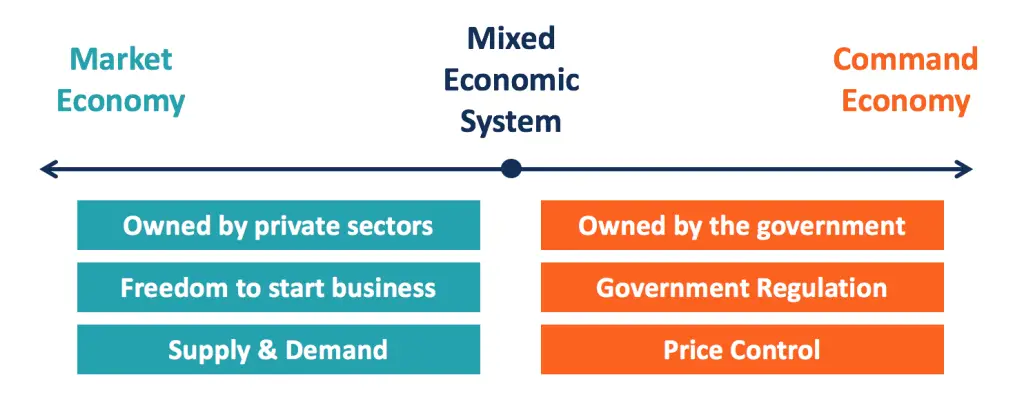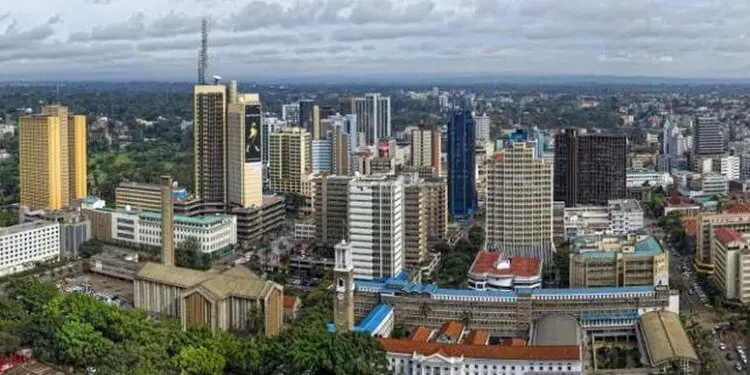Kenya’s economy has grown in leaps and bounds since the country gained independence in 1963.
The country has emerged as the top-performing economy in East and Central Africa, staying ahead of its regional and continental peers for several decades.
Kenya’s political stability, skilled labor, and strategic geographical location have endeared the country to global investors and many multinational companies (MNCs) have set up shop in various cities within the country.
These factors have accelerated Kenya’s economic growth and development making the country a lower middle-income state as of 2019.
Kenyan Economic System

Since independence, Kenya has had a mixed economic system, like many other countries across the globe.
The mixed type of economy is one which features a combination of market based private enterprises, State-owned public entities, and the joint sector.
The private sector comprises individuals or enterprises that own and control factors of production including land, capital, labor and entrepreneurial skills.
These entities are legally allowed to own property, sue and be sued in their name.
All the benefits accruing from the utilization of the factors of production are attributable to the owners of the business.
The government regulates how the private sector entities acquire and utilize the factors of production by passing laws and regulations and establishing regulatory bodies that enforce the laws and regulations.
As much as the private entities are allowed to practice free trade, they are under obligation to comply with government regulations and face dire consequences in case they fail to comply.
For instance, in Kenya, commercial banks are owned by private persons but the government regulates their business operations and dealings through the Central Bank of Kenya, acquisition of capital through the Capital Markets Authority and fair competition through the Competition Authority of Kenya.
The Kenyan government runs public sector institutions that offer public goods and services that are deemed essential for the socio-economic wellbeing of Kenyans.
These include hospitals, ports, postal services, electricity generation and distribution, etc.
State-owned entities freely compete for market share with private sector firms.
They are however formed through Acts of parliament, run on taxpayers funding, and their board members are appointed by the President of Kenya.
The joint sector of the Kenyan economy comprises public private partnerships (PPPs) whereby the government and private sector players enter into partnerships to carry on projects or provide services to the public.
In some PPPs, the private players may choose to forego financial and economic gains for the sake of the community. That is called corporate social responsibility.
In other cases, the private players help the government accomplish its missions by funding projects and getting economic gains in the form of interest income.
Major Economic Activities in Kenya

The economy of Kenya is dominantly agriculture-based.
The agricultural sector is the main driver of the economy and employs more than 40 percent of the Kenyan population.
The sector includes the production of subsistence and cash crops with the subsistence sector taking the bigger share.
Most farms are not mechanized, the scale of farming is small and heavily reliant on rainfall.
Most Kenyans are peasant farmers who grow crops for home consumption.
Cash crops grown in Kenya include tea, coffee, pyrethrum, horticultural crops, tobacco, sisal and wheat.
These crops are grown by private farmers as well as established firms. Most of the cash crop produce is exported to other countries for value addition.
Other significant economic activities in Kenya are tourism, financial services, and manufacturing.
Tourism industry in Kenya is so vibrant, thanks to the beautiful landscapes and lots of wildlife in game parks located across the breadth of the country.
The sector employs many Kenyans working in hotels, tour operating companies, and related establishments.
The financial services sector plays a significant role in providing access to credit for Kenyans.
It is a key driver of the economy as it helps spur economic activity in the public and private sectors, thus creating employment opportunities and social development for Kenyans.
From Savings and Credit Cooperatives (SACCOs), commercial banks, microfinance institutions and insurance companies, the financial institutions ensure credit facilities are fairly priced, access to insurance services, and that the unbanked are banked.
Subsistence Economy in Kenya
Even though the manufacturing, financial, hospitality, and many other advanced sectors of the Kenyan economy have been rising over the years, Kenya remains a largely subsistence economy with a large informal sector that produces low-quality commodities and subsistence farming, especially in the rural areas.
Many years after independence, Kenya mostly exports agricultural and mineral products in raw form as value-addition industries are almost non-existent.
That means the country gets low prices for its exports in the international markets because it sells mostly raw materials to other countries.
The country is a net importer which means the value of the goods and services it imports in a year is greater than its exports.
This has perennially made its balance of trade worse over time by creating a trade deficit with the import-export gap widening to Sh.1.37 trillion in 2022.
The gap is expected to worsen, especially with the recent acceleration in the loss of value by the Kenyan Shilling against the United States Dollar, which is the major import currency in the country.
Summary
In sum, the Kenyan economy is a mixed economy, where the government and private players play crucial roles.
Private sector players are allowed to own factors of production but within the confines of the laws and regulations of the Kenyan government.
The government on the other side, passes and enforces laws and regulations that must be adhered to by its own State Owned Enterprises (SOEs) and the private entities alike.
The economy is largely informal and subsistent with little value addition to produce and sluggish industrialization.
You may also want to check:

